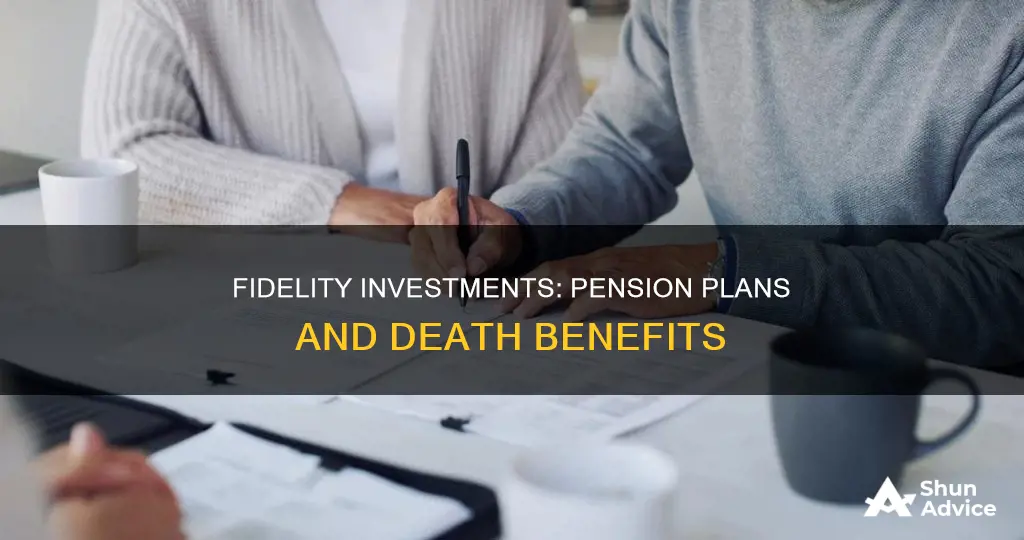
It's important to plan what will happen to your investments after you die, and this includes your pension. Fidelity offers a service called Expression of Wish, which allows you to tell the company how you would like your pension savings to be distributed in the event of your death. You can specify who you would like your pension benefits to be paid to, and in what proportions. You can choose up to 20 beneficiaries, including individuals, charities, or trusts, and you can also choose up to 10 nominees, such as your spouse or dependent family members. It's also important to note that your pensions are not legally part of your estate, so they are not covered by your will. Therefore, it's crucial to set up an Expression of Wish to ensure that your pension goes to the right people.
| Characteristics | Values |
|---|---|
| Number of beneficiaries | Up to 20 beneficiaries |
| Who can be beneficiaries | Individuals, charities or trusts |
| Beneficiaries' details required | Date of birth |
| Nominee details required | Date of birth, full name of spouse or civil partner, dependent family members or friends |
| How to notify Fidelity of a death | Online, by post or by phone |
| What to send to Fidelity | Original or certified copy of the death certificate, grant of representation |
| Where to send documents | Fidelity International, PO Box 391, Tadworth, KT20 9FU |
What You'll Learn

Notify Fidelity of the death
You can notify Fidelity of a death online, by post, or over the phone. You won't need death certificates or account numbers to start. However, you will need to send an original or certified copy of the death certificate, and, if it's available, the grant of representation (known as Certificate of Confirmation in Scotland). Send all your documents to:
> Fidelity International, PO Box 391, Tadworth, KT20 9FU.
Fidelity will always return the original copy of the death certificate as soon as possible.
Fidelity's dedicated bereavement team can be reached on 0800 41 41 16. They are open Monday to Friday from 8:30 am to 5:30 pm, and on Saturdays from 9 am to 12:30 pm.
Once you have notified Fidelity of the death, they will:
- Put a hold on the account
- Stop any dealing and reinvest any income generated by the investments
- Stop any regular savings or withdrawal plans (contributions made after the date of death will be returned as they cannot be accepted)
- Register you as the primary point of contact for the estate so that you receive all communications and can notify other parties accordingly
- Remove the investor’s name from any joint accounts they held
- Produce a valuation of the investor’s account on the day they died – you may need this for Inheritance Tax purposes or when applying for a grant of representation
You will need to contact Fidelity again when you have the grant of representation or a completed Small Estates Form.
Fidelity's pension trustees are responsible for deciding who benefits from the pension. They will write to you and tell you what additional information they need, such as details of trusts set up by the deceased, full names of any financial dependents, and copies of birth/marriage certificates.
Fidelity will consider the wishes of the deceased, as well as their personal circumstances, including their financial dependants, when deciding who can benefit from their pension. The beneficiaries can usually take the funds as a lump sum payment, keep the money within a pension to withdraw later, or use the money to purchase an annuity.
Pharma Mutual Funds: Invest Now or Later?
You may want to see also

Nominate beneficiaries
Nominating beneficiaries is one of the most important tasks you can do to ensure your pension benefits those you intend it to. Your pensions are not legally part of your estate, so they are not covered by your will. Therefore, it is crucial that you set out who you would like your pension to be passed on to when you die. These chosen individuals are known as your beneficiaries.
You can nominate one person to receive the entirety of your pension or divide the death benefits by stating a percentage amount to be given to various family members and/or friends. You can also nominate charities or trusts.
Fidelity's trustees will refer to your Expression of Wish as a guide when deciding how to distribute your benefits, while also considering your personal circumstances, including your financial dependents. This means the trustees will consider who you've appointed as your beneficiary(ies) and/or nominee(s) at their discretion.
You can choose up to 20 beneficiaries – individuals, charities or trusts – and specify how much each receives of your pension savings (as a percentage). You can also choose up to 10 individuals as your nominees, such as your spouse or civil partner, dependent family members or friends.
It is important to nominate primary as well as secondary beneficiaries in case something happens to your primary designation. You should also review your beneficiaries regularly in case of life changes such as divorce, additional children, or the death of family members.
If you do not nominate any beneficiaries, the distribution of your pension will be determined by the rules of your plan and/or state. In many cases, if a beneficiary is not specified, the proceeds will go into your estate and become subject to probate prior to distribution, a much longer and more complicated process than when you have specified an individual as a beneficiary.
You can nominate beneficiaries by completing an Expression of Wish form.
Index Funds: Is Cheaper Always Better?
You may want to see also

Understand tax implications
The tax implications of your Fidelity pension investments after your death depend on several factors, including the type of pension you have, your age when you die, and the choices your beneficiaries make. Here are some key points to consider:
- Self-Invested Personal Pension (SIPP): Your beneficiaries can usually inherit your SIPP tax-free and even pass it on to future generations, often free of both income tax and inheritance tax charges. If you die under the age of 75, the tax implications for your beneficiaries depend on whether they choose a lump sum, a pension, or an annuity. If they opt for a lump sum, the tax implications depend on how much Lump Sum and Death Benefit Allowance you had remaining when you died. If you die over the age of 75, your beneficiaries will pay tax on any benefits they receive, including lump sums, pensions, or annuities, at their marginal rate of income tax.
- Workplace pension: The tax implications depend on the type of workplace pension you have. For final salary pensions, if you die before the age of 75, the death benefit is usually paid tax-free to a dependent, such as a spouse or child under the age of 23, as long as it is paid out within two years of your death. For defined contribution schemes, your beneficiaries can be paid the remaining funds in your pension pot, and the tax implications will depend on their choices and their personal tax situation.
- State Pension: The tax implications for your spouse or civil partner inheriting your State Pension depend on whether you were already claiming your State Pension before April 2016. If the old State Pension rules apply, your spouse may be able to inherit a portion of the additional State Pension or lump sum you had built up. Under the new pension rules, if you die after April 2016, your spouse won't receive any extra State Pension that you may have built up or delayed claiming.
- Stocks and Shares ISA: If your spouse or civil partner inherits your ISA, it can be transferred to them without affecting their annual allowance. The inherited ISA remains income tax and capital gains tax-free for up to three years after your death, but it becomes part of their estate for inheritance tax purposes. If the assets remain in the ISA after three years and a day, the ISA account will be closed, and the proceeds will be held in a taxable account.
- Junior ISA: If a child inherits a Junior ISA, it can be transferred to them, but it loses its tax benefits from the date of death, and any income arising after the child's death is subject to tax.
It's important to note that tax laws and regulations can change, and you should always consult a tax professional for personalised advice regarding your specific situation.
Dave Ramsey's Top Fidelity Funds for 529 Plans
You may want to see also

Pension distribution options
Nominating Beneficiaries:
It is crucial to nominate beneficiaries who will receive your pension benefits after your death. You can specify individuals, charities, or trusts as beneficiaries and allocate the percentage of your pension savings each will receive. Fidelity allows you to choose up to 20 beneficiaries. Reviewing and updating your beneficiary nominations periodically is essential, especially after significant life changes.
Expression of Wish:
Fidelity offers an Expression of Wish form, which allows you to communicate your wishes for pension distribution. While the trustees have the final say, they will refer to your Expression of Wish and consider your personal circumstances, including financial dependents. Completing this form ensures that your wishes are taken into account and simplifies the process for your loved ones.
Tax Advantages:
Self-Invested Personal Pensions (SIPPs) offer tax advantages, both during your lifetime and upon your death. Your beneficiaries can usually inherit your pension tax-free and even pass it on to future generations without incurring inheritance tax or income tax charges.
Distribution Options for Beneficiaries:
Your beneficiaries typically have options for receiving the pension benefits. They can choose to take the funds as a lump sum payment, keep the money within a pension for later withdrawal, or use it to purchase an annuity. It is important to note that the distribution options may vary depending on the type of pension and your personal circumstances.
Workplace Pensions:
The distribution of workplace pensions depends on whether they are final salary or defined contribution schemes. Final salary pensions usually pay out a lump sum to a dependent, while defined contribution schemes allow beneficiaries to receive the remaining funds in the pension pot.
Remember, it is always a good idea to seek financial advice to understand the specific options available to you and make informed decisions regarding your pension distribution.
Mutual Funds: Invest Now or Miss Out?
You may want to see also

Contact Fidelity's bereavement team
Fidelity's bereavement team can be contacted on 0800 41 41 16. They are open Monday to Friday from 8:30 am to 5:30 pm, and on Saturdays from 9 am to 12:30 pm.
The team will guide you through the process of registering the death of a loved one with Fidelity. You will need the following information:
- Your personal details as the notifier.
- Personal details of the person who has died.
- Date of the bereavement.
- Customer reference number (CRN), Fidelity account number, or member code.
You can notify Fidelity online, by post, or by phone. You will need to send them an original or certified copy of the death certificate. If available, you should also send the grant of representation (known as the Certificate of Confirmation in Scotland). These documents should be sent to:
Fidelity International, PO Box 391, Tadworth, KT20 9FU.
Fidelity will then:
- Put a hold on the account, stop any dealing, and reinvest any income generated by the investments.
- Stop any regular savings or withdrawal plans.
- Register you as the primary point of contact for the estate so that you receive all communications and can notify other parties accordingly.
- Remove the investor’s name from any joint accounts they held.
- Produce a valuation of the investor’s account on the day they died – you may need this for Inheritance Tax purposes or when applying for a grant of representation.
Once you have the grant of representation or a completed Small Estates Form, you should send these to:
Fidelity PO Box 391 Tadworth KT20 9FU
Although the assets cannot usually be touched, they will remain invested – which means the value could go down as well as up. If you are worried about a possible loss in value, stocks and shares ISAs and general investments (but not pensions) can be switched to cash. To do this, you will need to send Fidelity a completed Declaration and Indemnity Form, plus the original or certified copy of the Will.
How to distribute the assets
This is when beneficiaries decide whether they want Fidelity to invest the money into a new account, transfer the investments into a new name, or sell them and send them the cash. There are forms to complete, potentially tax to pay, and different rules depending on the type of account.
Fidelity will pay close attention to anyone you have nominated to receive your pension on your Expression of Wish form. They will also take into account your personal circumstances, including your financial dependants. Once they have decided who can benefit from your pension, they will write to them to let them know their options. Your beneficiaries can usually take the funds as a lump sum payment, keep the money within a pension to withdraw later, or use the money to purchase an annuity.
Index Funds: Where to Start and What to Know
You may want to see also
Frequently asked questions
An Expression of Wish is a form that allows you to tell Fidelity who you would like to be considered as a beneficiary of your pension. This is not a legal requirement, but it will help make the process easier for your loved ones during a difficult time.
You can choose up to 20 beneficiaries – individuals, charities or trusts – and specify how much each receives of your pension savings (as a percentage). You can also choose up to 10 individuals as your nominees, such as your spouse or civil partner, dependent family members or friends.
If you don't complete an Expression of Wish, Fidelity's trustees will rely on information from your executor/administrator to determine any potential beneficiaries for your Self-Invested Personal Pension.
There are two types of company pensions: final salary or defined benefit schemes, and defined contribution schemes. Final salary pensions usually only pay out a death benefit in the form of a lump sum to a dependent, for example, your husband or wife or civil partner, or a child under the age of 23. Defined contribution schemes, on the other hand, allow you to have your own 'pot' of money which, if there is money left in it when you die, can be paid to your beneficiaries.







